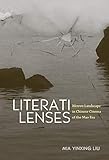Literati Lenses : Wenren Landscape in Chinese Cinema of the Mao Era / Mia Yinxing Liu.
Material type: TextPublisher: Honolulu : University of Hawaii Press, [2019]Copyright date: ©2019Description: 1 online resource (256 p.) : 19 color, 75 b&w illustrationsContent type:
TextPublisher: Honolulu : University of Hawaii Press, [2019]Copyright date: ©2019Description: 1 online resource (256 p.) : 19 color, 75 b&w illustrationsContent type: - 9780824859831
- 9780824859879
- 791
- online - DeGruyter
- Issued also in print.
| Item type | Current library | Call number | URL | Status | Notes | Barcode | |
|---|---|---|---|---|---|---|---|
 eBook
eBook
|
Biblioteca "Angelicum" Pont. Univ. S.Tommaso d'Aquino Nuvola online | online - DeGruyter (Browse shelf(Opens below)) | Online access | Not for loan (Accesso limitato) | Accesso per gli utenti autorizzati / Access for authorized users | (dgr)9780824859879 |
Browsing Biblioteca "Angelicum" Pont. Univ. S.Tommaso d'Aquino shelves, Shelving location: Nuvola online Close shelf browser (Hides shelf browser)

|

|

|

|

|

|

|
||
| online - DeGruyter Tracing the Itinerant Path : Jishū Nuns of Medieval Japan / | online - DeGruyter Ritualized Writing : Buddhist Practice and Scriptural Cultures in Ancient Japan / | online - DeGruyter Seeking Order in a Tumultuous Age : The Writings of Chŏng Tojŏn, a Korean Neo-Confucian / | online - DeGruyter Literati Lenses : Wenren Landscape in Chinese Cinema of the Mao Era / | online - DeGruyter Writing Pregnancy in Low-Fertility Japan / | online - DeGruyter Melal : A Novel of the Pacific / | online - DeGruyter Guardian of the Sea : Jizo in Hawaii / |
Frontmatter -- Contents -- Acknowledgments -- Introduction -- CHAPTER ONE. Picturing the Celestial Realm -- CHAPTER TWO. The Phantom Landscape of Jiangnan -- CHAPTER THREE. Early Spring in February -- CHAPTER FOUR. The Remnant Intellectuals -- Conclusion -- Notes -- Filmography -- Bibliography -- Index -- About the Author
restricted access online access with authorization star
http://purl.org/coar/access_right/c_16ec
Chinese cinema has a long history of engagement with China's art traditions, and literati (wenren) landscape painting has been an enduring source of inspiration. Literati Lenses explores this interplay during the Mao era, a time when cinema, at the forefront of ideological campaigns and purges, was held to strict political guidelines. This is a particularly intriguing period for the study of landscape in film, for while a film's script was under constant and multifaceted scrutiny, its landscape, a silent backdrop in the final production, tended to slip past censorial eyes.Author Mia Yinxing Liu examines literati landscape through four films: Li Shizhen (1956), Stage Sisters (1965), Early Spring in February (1963), and Legend of Tianyun Mountain (1979). By close readings of these "problematic," even "poisonous" films (official criticisms from Party media), she sheds light on how landscape offered an alternative text that could operate beyond ideological constraints and provide a portal for smuggling interesting discourses into the film. On the one hand, allusions to pictorial traditions associated with a bygone era inevitably took on different significances and even transformative meanings in the context of Mao-era cinema. On the other, unlike derivative citations or reverent homages, cinematic engagement with literati landscape endowed films with creative and critical space, as well as political poignancy. Liu not only identifies and investigates how the conventions, motifs, topoi, and aesthetics of traditional literati landscape art are reinvented and mediated on multiple levels in cinema, but also explores how post-1949 Chinese filmmakers configure themselves as modern intellectuals in the spaces forged among the vestiges of the old. In the process, she deepens her analysis, illuminating notions of utopia, monumentality, history, memory, representation, and re-appropriation. Landscape, she suggests, can be seen as an allegory of human life, a mirror of the age, and a commentary on national affairs.
Issued also in print.
Mode of access: Internet via World Wide Web.
In English.
Description based on online resource; title from PDF title page (publisher's Web site, viewed 02. Mrz 2022)


